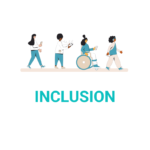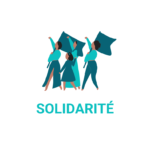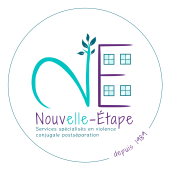About us
History
Notre organisme a ouvert ses portes en 1989 grâce à une initiative d’un des centres de femmes à Montréal. Des travailleuses de ce centre ont constaté un grand manque de ressources en matière de logement pour les femmes voulant rompre avec une situation de violence et ont mis en place un projet en collaboration avec différents partenaires. C’est alors que s’est consolidée l’idée de logements temporaires pour répondre aux besoins de sécurité des femmes aux prises avec le harcèlement de leur ex-conjoint, tout en leur permettant d’assurer une démarche d’autonomie.
Dès nos tout débuts, le conseil d’administration de Nouvelle-Étape a réalisé que, faute de financement, les services de soutien aux femmes et aux enfants étaient précaires. De ce fait, le conseil d'administration a pris comme décision de demander au centre de femmes d’en assurer l’entière mise en œuvre. Ceci sera possible grâce à ce centre de femmes qui a réussi à cette époque à aller chercher du financement pour ce projet.
En 2018, avec le travail acharné de l’Alliance des maisons d’hébergements de 2e étape pour femmes et enfants victimes de violence conjugale postséparation, nous recevons officiellement notre premier financement sur la base de notre mission globale. Nous enclenchons alors le processus de consolidation et de bonification de nos services, notamment concernant le volet milieu de vie communautaire ainsi que le soutien spécialisé en services sociojuridiques.
En 2019, le financement pour les maisons d’hébergement de deuxième étape devient officiellement récurrent, ce qui nous amène à entamer une réflexion stratégique avec le centre de femmes. C’est en juin 2020 qu’une décision officielle quant à l’autonomie de Nouvelle-Étape est prise. Nous formons alors une toute nouvelle équipe pour relever ce nouveau défi !

Mission
Nouvelle-Étape est une maison de 2e étape qui offre des services spécialisés en violence conjugale postséparation par l’entremise entre autres, d’un hébergement sécuritaire et transitoire.
La violence conjugale postséparation c'est quoi ?
« C'est la violence conjugale qui se manifeste sous toutes ses formes en contexte post-séparation. On entend par contexte post-séparation le moment où la femme prend la décision de mettre fin à la relation et qu'elle s'inscrit dans une démarche de réorganisation de vie et de reprise de pouvoir. C'est une période où les stratégies de domination et de contrôle de l'ex-conjoint se transforment, se multiplient et perdurent, exposant ainsi la femme et ses enfants à un plus grand risque d'atteinte à leur sécurité (physique et psychologique) pouvant aller jusqu'à l'homicide » (L'Alliance des maisons d'hébergement de deuxième étape pour femmes et enfants victimes de violence conjugale postséparation)
À travers notre offre de services en violence conjugale postséparation, Nouvelle-Étape permet de : renforcer l'autonomie des femmes; contribuer au renforcement du lien mère-enfant; soutenir les enfants dans leur vécu et agir sur les conséquences de la violence conjugale; contribuer aux changements sociaux liés à la violence conjugale; favoriser une prise de conscience sociale sur les enjeux de la violence conjugale; offrir une réponse adéquate aux femmes et à leurs enfants à long terme.
Our vision : Nouvelle-Étape souhaite agir comme un tremplin qui propulse les femmes vers un changement de leur condition de vie, en assurant la sécurité, leur stabilité et leur autonomie.

Values

The uniqueness of people is a treasure. Every woman is welcomed in her globality and with her diversity. By paying close attention to the specific needs of each woman and by ensuring equity for all.

The necessity to unite in order to emancipate by being part of a group that aims to counter all forms of oppression. Through collaboration, mutual listening, and the search for collective well-being.

The right to be yourself and to exist. To have the opportunity to make fully informed and conscious decisions. Through a secure environment that promotes the empowerment process.

By promoting kindness and sensitivity to the well-being of all. By respecting yourself, others and your limits. Through actions of profound humanity.

Together, seeking a violence-free society and equal rights for all. Through activism, mobilization and advocacy, fight systemic oppression.

Inner strength that allows innovation in a hopeful vision to aim for a better life. Through a mobilizing creativity and a space of freedom and discovery.
Intersectional feminist intervention approach
Intersectionality is an inclusive feminist approach that acknowledges the intersection of the systems of oppression through which a person may find themselves. In other words, in addition to acknowledging that the patriarchal system oppresses women, the recognition of other systems of oppression (classism, racism, homophobia/transphobia, ableism, ageism, etc.) makes the understanding of women's experiences more inclusive and accurate. All of these systemic discriminations and violences must be addressed simultaneously since one does not prevail over the other and because they reinforce each other.
Here is how it translates into our interventions:
- Empowering women to control their lives (empowerment) while respecting their own pace;
- Supporting and providing women with the tools they need to reach their full potential for autonomy;
- Promoting alliance through empathy and transparency in an equal relationship;
- Believing in women's lives and recognizing that they are the true experts and that they are free to make their choices and to control their own bodies.
- Promoting advocacy by demanding structural change. With women: to be critical of the patriarchy and gender stereotypes that support the oppression of women;
- Joining forces with women to be aware of their individuality and their globality by taking into account all the systems/forms of oppression they experience and supporting them in their action;
- Recognizing how we are positioned at the intersection of the different systems of oppression, our privileges and deconstructing our biases;
- Welcoming all women with openness and regardless of their situation and their methods of survival. Recognizing that the difficulties encountered are directly related to the violence they have experienced;
- Personalizing our interventions according to each woman's reality, her social conditions and her motivations for making decisions;
- Putting women's experiences into perspective by encouraging them to speak out and share their experiences in groups;
- Promoting the approach "by, for and with women";
- Supporting women in their journeys by defining violent behavior as a choice and a power issue rather than a loss of control.
